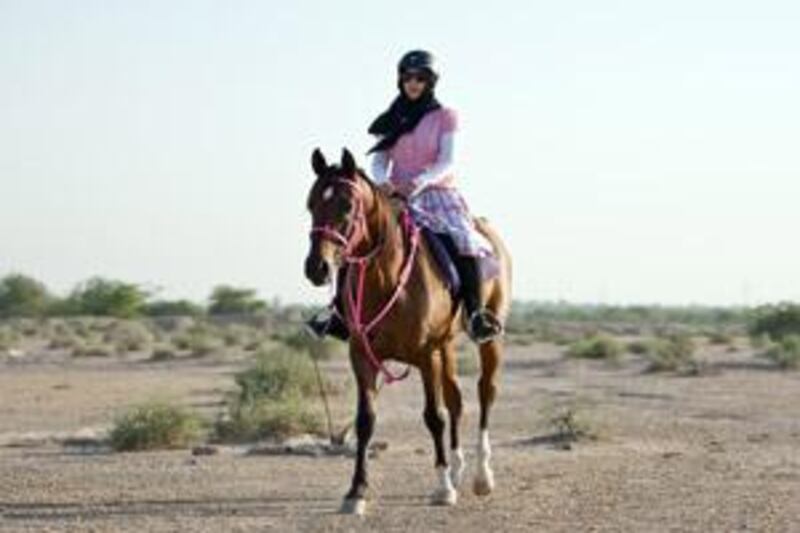Dubai // For many Emirati women, horse riding is an impossible dream. They face frowns from a traditional society, starting with family, that views riding as something only for men. Hanan al Muhairi wants to eliminate the stigma and make the dream a reality. After four years struggling to complete her documentary film about the first female horse riding team in the UAE, Ms al Muhairi is now on a mission to set up the first club for any Emirati woman who wants to ride.
"I want a place that will be a link between the UAE's greatest horses, and its future horse riders," said Ms al Muhairi, 24, who as a rider and horse lover is determined to change attitudes. The documentary takes a hard and honest look at the struggles, dreams and reality of horse riding for an Emirati woman. The movie, called Arabyana, after the six-member female riding team, was released in April after four years of delays and obstacles owing to the sensitivity of some topics it dealt with and high-profile interviews that took time to arrange.
"It is about our right to ride, and the challenges we face from our own community whenever we pursue less than traditional activities," she said. "It is not fair just to keep men in the spotlight of the equestrian field and ignore all the female talents in the same field," she said. The interviewees included: Sheikha Madeya Bint Hasher Al Maktoum, a young UAE horse rider who specialises in endurance races; the champion horse rider Sheikha Latifa Al Maktoum, who participated in the Olympics; and Princess Haya, wife of Sheikh Mohammed bin Rashid Al Maktoum, Vice President and Ruler of Dubai, who is a horse rider herself.
The documentary was made under Princess Haya's patronage. It also featured Sheikh Nahyan Al Mubarak and Sheikh Talib Al Qassimi. "Horse riding is not just a man's sport; a woman can also be a great horse rider and she can do it as a lady," said Ms al Muhairi, a member of the UAE's female riding team. By wearing a black scarf and loose clothing as she rides her horse in the documentary, Ms al Muhairi says she is trying to show her people that "you can be a good Muslim girl and a great horse rider". "So why not open for us a place where we can train and ride freely without social or financial pressures?" she asked. The six young women, all of whom studied different majors at Dubai Women's College, would like to expand their team and compete in national and international competition.
Ms al Muhairi said she knows of many horsewomen who would like a chance to ride for their country. "We are dedicated, just give us a chance," she said. "It shouldn't be limited just to the royals, it is a sport for everyone." Besides horse riders, Ms al Muhairi's documentary also features religious experts, historians and medical experts who discuss controversial aspects of horse riding that are often raised, such as it being "un-Islamic" or that it compromises a lady.
"Many told me it is Ayb (shameful) to discuss certain things, but I say if we are shy to talk about controversial issues then we can never move forward," she said. Other issues addressed were the widely held fear of losing traditional dress and manners, and worries about meeting and mixing with men in the equestrian field. "It is a professional field and people need to realise that," she said. "The point of documentaries is to reflect on reality and to make people think about an issue in a way they never thought before and perhaps one they didn't give that much importance to in the first place," she said.
Through the film, Ms al Muhairi explores the views of Emirati men on whether their wives, daughters or sisters should be allowed to ride, as well as what would change old, rigid perspectives. The documentary helped break other barriers. Ms al Muhairi's cousin, Mahfotha al Omar, 20, whose dream is to sing, got her chance in the film. "The first thing people heard was my voice, singing out traditional poetry as the documentary began against a backdrop of horses and horse riders," said Ms al Omar, who provides the voice-over. Her conservative family would never allow her to pursue a musical career.
"It is a passion that is within my heart that comes out as song, so I sing all the time at home as I am not allowed to sing outside," she said. Her inspiration comes from renowned Arab singers such as Umm Kulthum. The documentary helped her land a job as a voice character for cartoons, which she hopes will one day help her reach her dream of singing. With plans for future documentaries on the back burner for now, Ms al Muhairi is adamant about finding sponsors to help her set up the horse riding club for women, which so far has been difficult.
"People are still not open to the idea, but I will find a way," said the assertive young woman, who is currently trying to get her documentary into international film festivals. "Maybe pressure from outside can help open a window here," she said. "Who knows, anything is possible if you work hard and follow your dreams." rghazal@thenational.ae






